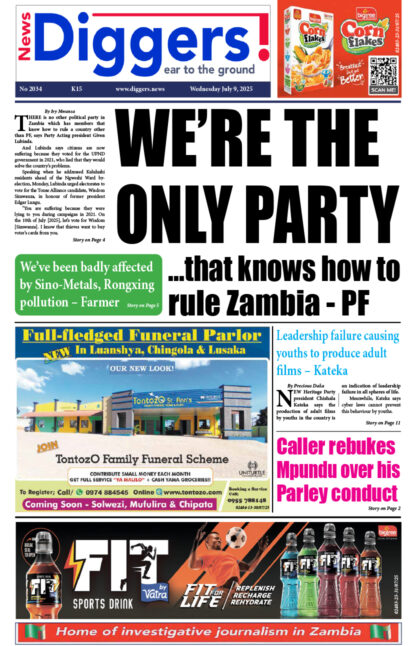The IMF has assured us that despite President Edgar Lungu’s declared Threatened State of Emergency, the Fund is still committed to reaching an agreement with the Zambian government for the loan deal. But to us, something doesn’t just tie up on this IMF ‘standoff’ which is, quite frankly, becoming a nuisance. We have taken time to inquire from local and international financial experts, economists and political scientists about what they make of the IMF hullabaloo.
From our findings, there is every indication that the much talked about US $1.6 billion funding by the International Monetary Fund may not even succeed. The Government, through the Minister of National Development and Planning Lucky Mulusa, has boasted that Zambia is not desperate for any aid package from the IMF. President Edgar Lungu recently told a media conference that if the IMF had problems with the declared Threatened State of Emergency, ‘they can go’.
First, to say ‘they can go’ implies the IMF is already on course with the programme. Far from it. The IMF is not even here because the ball of facilitating for a successful implementation of the programme is in the court of government. We have learnt that during the most recent visit by the Fund, a lot of time was spent reconciling local and international debt. The multilateral Bretton Wood lender is extremely meticulous about lending money to unstable economies. The recent experiences in Mozambique where it had to exhume undeclared debt guarantees by that government has taught the IMF a huge lesson about the need to tighten all loose nuts prior to lending.
The primary process in implementing a programme by the Fund is ensuring the Debt Sustainability Assessment is thorough. All existing debts whether due for repayment at that moment or in future must be reconciled and declared. Once this has been ascertained, the IMF will decide whether or not a country qualifies for any debt. The figure of US $1.6 billion has been floated for over a year now even before government made a request. This number has never been on the lips of IMF Mission Chief Tsidi Tsikata, a Ghanaian national whose retirement from employment is said to be delayed by the Zambia programme. US $1.6 billion could be the imagination of the Zambian authorities. That could be the amount Zambia is desperately in need of to square off the deficit in its balance of payments position.
Going by most recent experience in Sub Sahara Africa, the IMF programme may be in the range of US $600 million. The actual position would be determined by the Debt Sustainability Assessment. We have learnt that, as at now Zambia’s debt figures are not reconciling. The domestic debt figures are not speaking to each other- what the auditors have and those existing on the books of various ministries are not the same.
International debt equally requires reconciling. It is believed that the figures the government officials computed are those for debts due for repayment. The rest remains guess work. The Chinese debts have continued coming even when a programme is running. This is like trying to assess the actual ailment of a patient to determine the dosage but the patient keeps acquiring new ailments before the assessment is completed. This could be hard for Tsikata and IMF team. Would this be the structural benchmark the IMF has pronounced as ‘action steps for a programme to take effect’? Is the Zambian Government ready to undergo this rigorous examination at this stage?
Government believes it is no longer a patient and the examination is unnecessary. The flu that was widespread, devastating its economic potential, no longer exists. Mulusa’s bragging that Zambia is not desperate for IMF help is strange and suspicious. It seems the government has been flattered with the monetary policy engineering by the Bank of Zambia that has succeeded to keep the temperature low (of course without treating the disease). We understand that the government had to borrow specifically to cover salaries for last month. But assuming that was not the case, assuming Zambia was on the right track; the exchange rate favouring the Kwacha, economic growth revised upwards, copper prices rebounding, load-shedding over and President Lungu is launching Chinese funded projects day in day out; how can President Lungu, Mulusa and those who are boasting forget that those uncompleted projects are accumulating astronomical interest rates in favour of the contractors who are currently smiling and sipping coffee in their offices?
In short, Zambia is no longer as desperate for the IMF programme as it was last year because it is not ready for the conditionalities and the debt sustainability analysis is not reconciling. Only Finance Minister Felix Mutati knows that the fiscal position of Zambia is still in dire straits.
The sinking fund for the sovereign bond which matures in the next few years is reported to be empty. The Chinese funding for projects does not come in cash terms, to support the cross-border transactions in form of balance of payments. Zambia’s position on import cover is dangerously low, and we understand that gold reserves have been depleted. The warm-cloth massaging by the Bank of Zambia to keep the monetary temperature low has only managed to devastate cash positions of commercial banks. Right now, many banks have no cash, only sustained by overnight lending which is further weakening their balance sheets. Some banks are no longer lending money but spending time asking their clients to deposit cash. Others have gone the extent of intermittently switching off their electronic system to reduce the amount of money withdrawn from the automatic machines. It is a common occurrence to encounter messages of ‘sorry, the system is down’ displayed on ATMs. There is certainly a problem in the country, many companies are facing liquidations. Does Zambia truly not need IMF funding to put the macroeconomic benchmarks in order?
The Chinese formula of project financing is only good for China which is now able to lend long term for projects managed by Chinese companies, using Chinese labour and utilising Chinese manufactured inputs. The fact that the Chinese are smiling now should not be reason to think Zambia’s economic problems are over. The IMF loan is needed for more reasons than balance of payments support. The Fund will have a firm grip on financial discipline. It will also facilitate funding from other donors.
What the government might be ignoring is that donor support to Zambia is on hold awaiting the successful conclusion of the IMF programme. Donors want to lend money to countries that have structural capacity to manage funds. The voice of donors is currently muted in areas of governance because their exposure to Zambia is currently low. They have rarely said anything on the legally challengeable incarceration of Hakainde Hichilema, the leader of the United Party for National Development, because they cannot tie their voice to funding. Only the European Union did speak because of its anticipated multimillion dollar renewable energy support to Zambia.
The donors may have a voice on Zambia’s governance record once the programme request goes to the Executive Board of the IMF. The IMF does not speak on governance. They lend as long as there is a government in place. IMF is in business of making money. However, the Board can have some economic reason to reject it without necessarily referring to governance. The Executive Board members represent their respective countries and there can never be any better opportunity to re-engage Zambia on faltering democratic benchmarks than at the time of approving the programme. The Board can stop the program if they see need to do so. This possibility may explain why the Zambian government may pre-empt the decision by asking the IMF to ‘get out’ even before it comes in. By the way, once the IMF comes in, it will be impossible to ask it to get out without dire consequences!




















One Response
This is a lovely piece of article, keep it up.